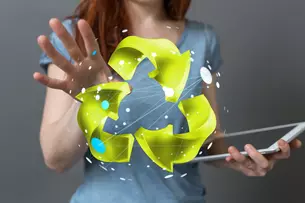Digitalization in municipal waste management and city cleaning has many facets. Considerable progress has been made in some areas, while others are still evolving. In the following, Yvonne Krause, consultant for city cleaning and digitalization at the German Association of Local Utilities (VKU), will provide some insights.
Municipal waste management companies and city cleaners have been dealing with topics such as robotics, sensor technology, artificial intelligence (AI), automation and user interfaces for some time now as part of the digital transformation. Digital fill level measurement is one of the smart solutions already used or at least tested in many places, with sensors in waste containers and bins helping to optimize emptying routes and make them more dynamic, i. e., depending on the fill level of the bins. Additionally, citizens can also use the smartphone app to report full bins and littered areas. The necessary technical components are already working very well. The overall infrastructure, i. e. the smart interaction between sensor networks, AI and networked information, offers the greatest potential for optimization. Whether digital level measurement can minimize logistics costs while maintaining a reliably high level of urban cleanliness in the future remains to be seen: Though dynamic routing offers predictive analytics, does it also reduce operational costs?

Digital assistants that facilitate AI-based verbal interactions are another example of the impending digital transformation within the industry. Smooth interactions between humans and machines are already possible today, leading to a dialog-based self-service that can resolve citizens' concerns immediately, regardless of the time of day. Here, chatbots and voice assistants are becoming increasingly intelligent and popular. Especially younger users are already using digital helpers and are open to new technologies. As such, voice assistants are future-oriented solutions that bring together current technology trends and customer needs.
Small pieces of trash, such as cigarette butts, crown caps and broken glass, often pose a major challenge—especially in areas where sweepers cannot be used, such as lawns, gravel or paved areas. In test operation, autonomous cleaning machines are already capable of identifying and removing these objects in a targeted manner: they use an AI-based image recognition system, which also makes sure that the machines can navigate safely, thus enabling them to clean a target area on their own.
Several municipalities are also running tests for the potential use of autonomous road sweepers, showing that routing and sensor technology already work very well. However, the cleaning performance quality can still be improved by training the AI to optimize the process. Additionally, the regular use of an autonomous sweeper in road traffic is currently not yet possible, not least for legal reasons.
All aspects of the digitalization in the environmental industry will also be one of the main topics at IFAT Munich 2022. At the World’s Leading Trade Fair for Water, Sewage, Waste and Raw Materials Management, the VKU for example will be offering a solution tour entitled “Digitalization in Waste Management.”
Yvonne Krause is a consultant in the waste management and city cleaning division at the German Association of Local Utilities (VKU). In this function, she is responsible, for example, for supporting the digital transformation of the sector, emphasizing on identifying long-term trends and new digital business models.